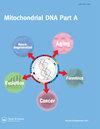The phylogenetic placement of Odontobutis obscura base on complete mitochondrial DNA sequence
IF 0.6
4区 生物学
Q4 GENETICS & HEREDITY
引用次数: 2
Abstract
Abstract In our research, 16 sets of primers were used to amplify contiguous, overlapping segments of the complete mitochondrial DNA (mtDNA) of Odontobutis obscura. The aim of our research was to provide some important genetic background information for conservational practice of these valuable fish species. The total length of the mitochondrial genome is 16 864 bp and deposited in the GenBank with accession numbers KT438552. The gene arrangement and transcriptional direction were similar to other bony fishes which contained 37 genes (13 protein-coding genes, 2 ribosomal RNA, and 22 transfer RNAs) and a major non-coding control region. The nucleotide skewness for the coding strands of O. obscura (GC-skew = −0.26) is biased toward G and the negative GC-skew ranges from −0.51(ND2) to −0.24(CO1). The phylogenetic analysis showed that the Gobiiformes could be divided into three groups, Eleotridae, Odontobutidae and Rhyacichthyidae. The O. Obscura and O. Potamophila are sister species and clustered together.基于全线粒体DNA序列的黑齿蟾系统发育定位
摘要本研究利用16组引物扩增了暗齿齿蟾(Odontobutis obscura)线粒体完整DNA (mtDNA)的连续重叠片段。本研究旨在为这些珍贵鱼类的保护实践提供重要的遗传背景信息。线粒体基因组总长度为16 864 bp,储存于GenBank,登录号为KT438552。基因排列和转录方向与其他硬骨鱼相似,共包含37个基因(13个蛋白质编码基因、2个核糖体RNA和22个转移RNA)和一个主要的非编码控制区。暗室O. obscura编码链的核苷酸偏度(GC-skew = - 0.26)偏向于G,负GC-skew范围为- 0.51(ND2) ~ - 0.24(CO1)。系统发育分析表明,gobiiformae可分为Eleotridae、Odontobutidae和Rhyacichthyidae三个类群。O. Obscura和O. Potamophila是姐妹物种,聚集在一起。
本文章由计算机程序翻译,如有差异,请以英文原文为准。
求助全文
约1分钟内获得全文
求助全文
来源期刊

Mitochondrial Dna Part a
Biochemistry, Genetics and Molecular Biology-Genetics
CiteScore
3.00
自引率
0.00%
发文量
6
期刊介绍:
Mitochondrial DNA Part A publishes original high-quality manuscripts on physical, chemical, and biochemical aspects of mtDNA and proteins involved in mtDNA metabolism, and/or interactions. Manuscripts on cytosolic and extracellular mtDNA, and on dysfunction caused by alterations in mtDNA integrity as well as methodological papers detailing novel approaches for mtDNA manipulation in vitro and in vivo are welcome. Descriptive papers on DNA sequences from mitochondrial genomes, and also analytical papers in the areas of population genetics, phylogenetics and human evolution that use mitochondrial DNA as a source of evidence for studies will be considered for publication. The Journal also considers manuscripts that examine population genetic and systematic theory that specifically address the use of mitochondrial DNA sequences, as well as papers that discuss the utility of mitochondrial DNA information in medical studies and in human evolutionary biology.
 求助内容:
求助内容: 应助结果提醒方式:
应助结果提醒方式:


